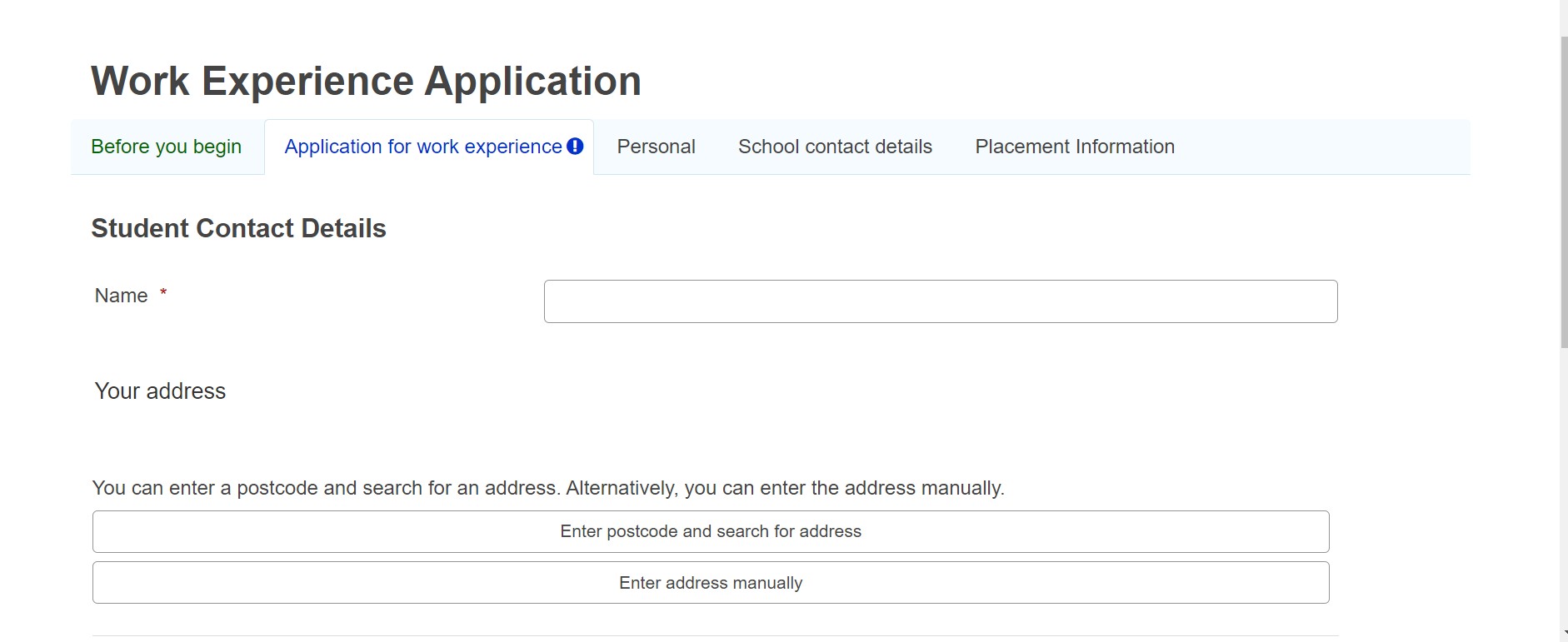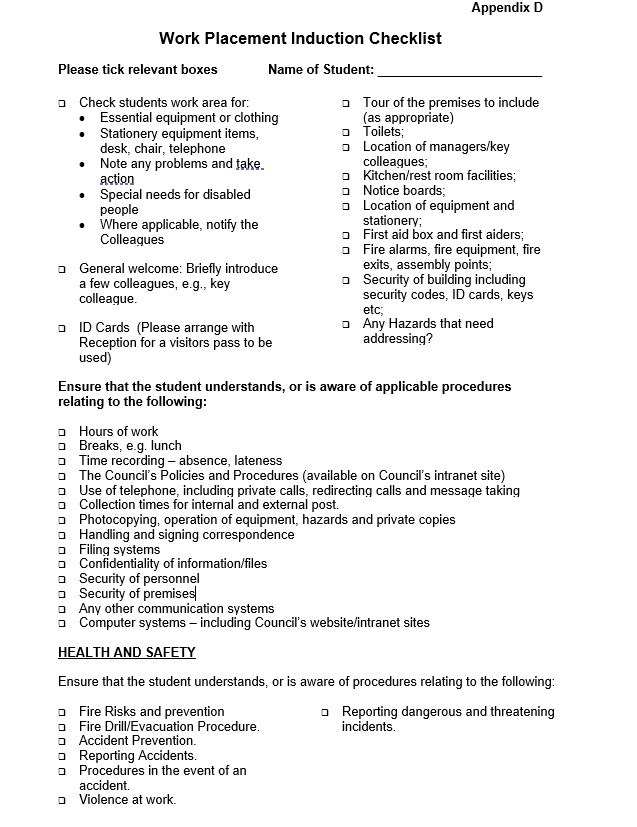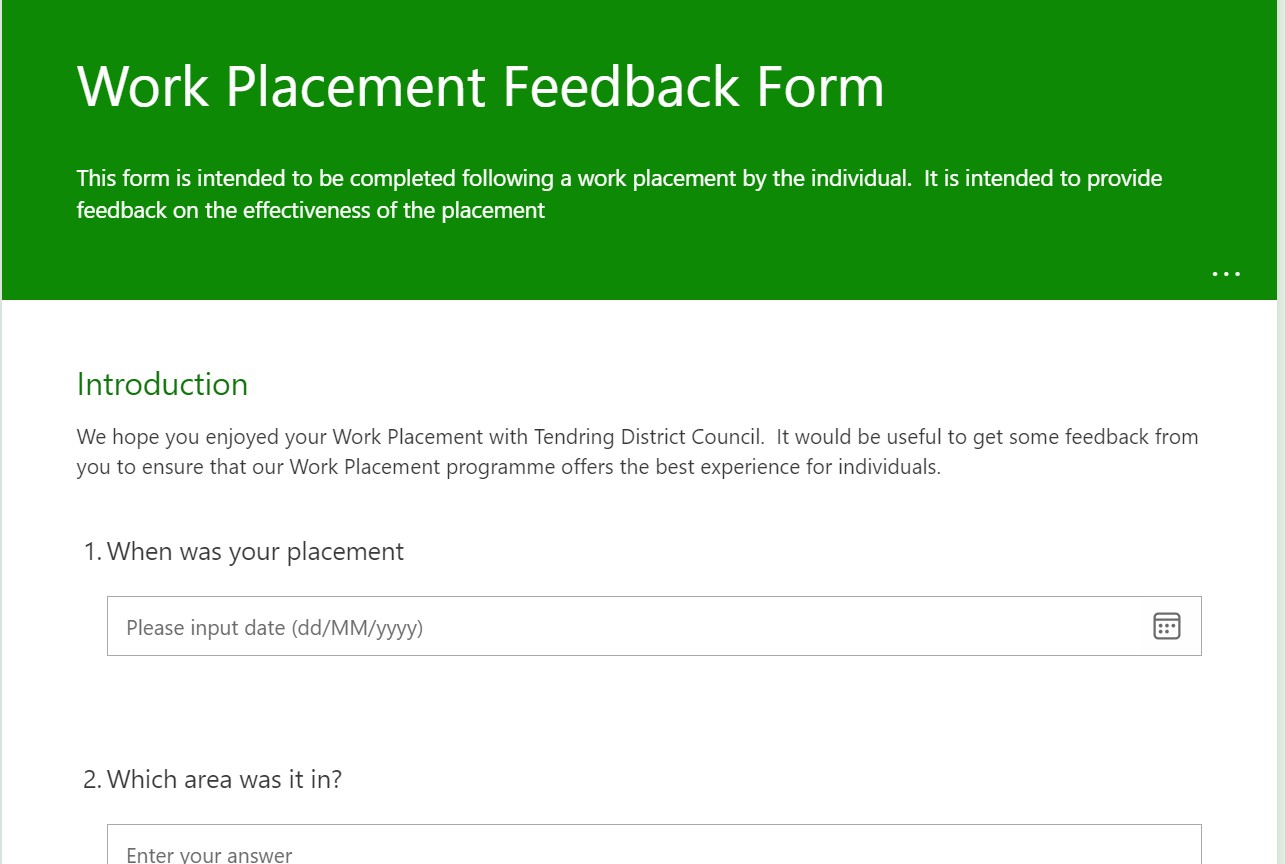Tendring District Council recognises that work placements are an essential way for young people to experience and understand work, particularly within Local Government. Placements within the Council can assist with developing skills and improving employability in the future as well as enhancing a CV.
The Council recognises the importance of its role as an employer within the Tendring District and is committed to supporting students within local schools and colleges. Additionally, with the market force pressures this gives an ideal opportunity for local people to consider work placements to gain experience in roles within Tendring District Council.
Work placement (experience) has been defined as “A placement on the employer’s premises in which students can carry out a particular task or duty, or a range of tasks or duties, more or less, as would an employee, but with the emphasis on the learning aspects of the experience”.
Work placement (experience) is governed by the Education Act 1996, as amended by the School Standard and Framework Act 1998. The main points are:
• Only students in their last 2 years of compulsory schooling, or students taking courses beyond the age of 16 are eligible.
• Placements occur on employer’s premises; and
• The majority of placements for under 16 years of age last for 2 weeks, for over 16 years of age placements can be more varied in length depending on the course being followed.
Work placement (experience) is part of a student’s education, and therefore the Council should make no payment for any work performed, whether to the students, schools or colleges.
The Council will offer 6 work placement vacancies to students each academic year. The vacancies will be offered in September of each year and will be allocated via a formal interview process. The placements can occur at any time during the academic year. Preference should be given to applicants within the Tendring District, in order to allow the Council to support our local schools and community.
Applications should be made using the Work Placement Application Form available on Tendring District Council’s website (see Appendix A).
Vacancies will be offered across the Council. Placement areas are changeable depending on the needs of the Council. Generic job descriptors are available as a guide to the duties the postholder may be expected to undertake. It is not required to be exhaustive or exclusive and will be agreed as working requirements dictate.
Only applications made on the Council’s Work Placement Application Form will be considered. Managers within each Department will be responsible for shortlisting, interviewing and appointing their suitable students. They must also ensure that all risk assessments and other supporting paperwork has been completed prior to any placements commencing. Copies of such paperwork should be submitted to Human Resources.
All Managers should give their time and commitment to supporting students during their work placement, to make their experience with Tendring District Council as positive and rewarding as possible.
At the end of the Work Placement an evaluation form will be sent to the individual to gain feedback for Tendring District Council on the work placement and to highlight areas for improvement.
The Health and Safety at Work Act 1974 places a statutory duty of care on all employers with respect to the health, safety and welfare of their employees. The Health and Safety (Training for Employment) Regulations 1990, extends that duty to any person (student) undertaking work experience within an employers organisation. In all cases, a student that is participating in work experience is to be regarded as an employee of the Council, for the purpose of health and safety.
Under the Management of Health and Safety at Work Regulations 1999, placement providers have particular duties to young persons (including students). It is essential that:
• Students are properly prepared and briefed on the potential hazards in the workplace and any control measures provided to reduce or eliminate risk or injury before
they start work.
• The allocated supervisor for the student and their colleagues, are aware of what is expected of them and their legal responsibilities.
• The school or college is clear about its responsibilities in arranging placements for students and introducing them to general safe working practices, prior to the placement.
Every Department hosting a work placement (experience) student must complete a risk assessment (Appendix B), before the placement commences. Due to the limited experience of students, it is important to be aware that more than the standard level of supervision will be required, to ensure that they work safely.
When students are below the compulsory school leaving age, e.g. 16, the Council must provide their parents / guardians with the key findings of the risk assessment. Whilst there is no legal requirement to provide this information in writing, a copy of information given should be retained to protect the Council from any subsequent dispute arising from an accident.
The Working Time Regulations 1998 also apply to work experience students, and their working pattern during their placement should reflect this. Further guidance can be sought from the Council’s Intranet.
The Council has the necessary insurance in place to cover work experience placements. Schools and Colleges providing students for work placements, will be provided with insurance details upon request.
The Department for Children, Schools and Families provides guidance on safeguarding young people during work experience. The guidance states that where the employer does not have regular unsupervised access to the student, there is not a requirement for those staff to have undergone a DBS (Disclosure and Barring Service) check. However, DBS checks must be in place where:
• Students undertaking work placement (experience) have been identified by the school or college as vulnerable for educational, medical, behavioural or home circumstance reasons.
• The student’s placement is due to last for more than 15 calendar days over an extended period.
• Where the student’s placement involves regular lone working with an employer over long periods, i.e. more than half a day at a time.
• Where placements are located in isolated environments.
• Where placements involve a high degree of travelling.
Where any of these elements are relevant to a placement, an assessment should be made of the overall potential risks to the student, and any systems which are in place to minimise these risks. The decision can then be taken whether or not a DBS check is necessary.
Please note: it may be necessary for the student themselves to undergo a DBS check if the work placement (experience) provides them with unsupervised access to children or vulnerable adults.
There is an online application form on Tendring District Council’s website, link and screen prints below. There is information on the types of placements, additionally contact details for the applicant and school are captured as well as the reason for applying for the Work Placement. Below is the first page of the online form:

Link from Tendring District Council’s Website
https://tendring-self.achieveservice.com/service/Work_Experience_Application
Work Placement Risk Assessment
This risk assessment is to ensure that all factors relating to a young person engaging in work activity with Tendring District Council are addressed prior to the commencement date.

(Insert Date)
Dear (insert name),
Re: Work Placement Agreement
Further to your recent interview, I am pleased to confirm our offer of a Work Placement within Tendring District Council.
The placement is for the period from (insert date) to (insert date) based in (insert name of Department).
The Department is located at:
....................................................................................................................................
The name and contact details of your work Supervisor is:
………………………………………………………………………………………………
Please read the Terms and Conditions carefully and sign both copies of this letter, returning one to Human Resources, Tendring District Council, Town Hall, Station Road, Clacton-on-Sea, Essex CO15 1SE.
Terms and Conditions of Work Placement
Sick Leave Arrangements - If you are unable to attend your work placement due to ill health, you should inform your Supervisor as soon as possible, and keep them informed of your likely date of return.
Identification Badge – It is a requirement for all Council employees/visitors to display an I.D. badge and you will be provided with a temporary card on your first day. This must be returned at the end of your period of placement.
Dress Code – Students are expected to wear suitable clothing and footwear for the workplace and always be neat and tidy. Any protective clothing or equipment provided should be used as instructed.
Confidentiality – Any matters of a confidential matter must not be disclosed to any unauthorised person. Any breach of confidentiality may result in a placement being terminated.
Health and Safety – You are reminded that in accordance with the Health and Safety at Work Act 1974, you have a duty to take reasonable care not to cause injury to yourself or others whilst carrying out your work duties. A copy of the Council’s Health and Safety Policies are available from your Supervisor.
Smoking/Vaping – Smoking/Vaping is strictly forbidden in any Council vehicles, premises or surrounding boundaries.
Loss / damage of personal effects – No liability can be accepted for loss or damage of personal property whilst on Council premises. Please take care of your belongings and only bring necessary items with you.
Working Time – During your work placement you will be required to attend during normal office hours, these are 9.00am to 5.00pm Monday to Thursday, and 9.00am to 4.30pm on Friday. You will be given a one hour lunch break at a time agreed with your Supervisor. Hours of attendance can be made flexible to accommodate travelling etc, as agreed with your Supervisor.
Remuneration - During your period of placement you will not at any time, except where the law requires, be regarded as an employee of Tendring District Council, and will not therefore be eligible for pay in respect of your work placement.
We look forward to you joining us here at Tendring District Council, and hope you find your placement interesting and rewarding. If in the meantime you have any questions, please do not hesitate to contact your Supervisor stated.
Yours sincerely,
Katie Wilkins
Human Resources and Business Manager
___________________________________________________________________
Acceptance and Parental Consent
I have been provided with a copy of a job description and risk assessment for the work placement outlined above. I have read and understood the Terms and Conditions of my placement and retained a copy for my records.
Signed: __________________________________ Date: ______________
Print Name: __________________________________
Parent/guardian’s signature if under 18: _______________________________
Print Name: __________________________________ Date: ______________

A Work Placement Feedback Form has been developed to capture feedback from the individuals. This will ensure that we are providing the best opportunity and are aware of areas of improvement. This should be sent out withing 1 week of the Work Placement completing. Below is a copy of the first page, link to electronic form
Link to Work Placement Form
